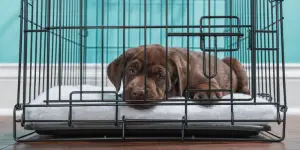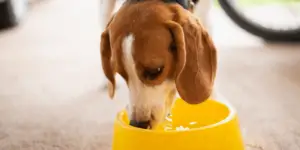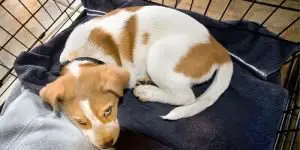
Puppy dehydration - causes and symptoms to understand
- Written by Joshua Gordon
- Last updated
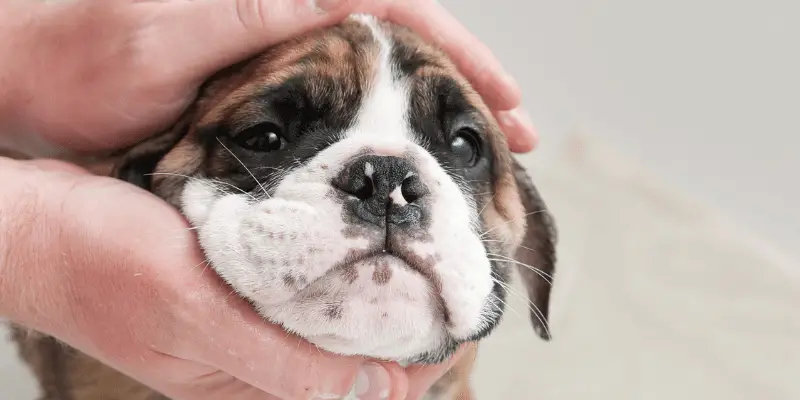
Puppy dehydration. Key takeaways
Be aware of common causes of puppy dehydration. Inadequate fluid intake, diarrhea, vomiting, fever, and heatstroke. Always seek Vet advice if any symptoms persist.
- Look out for symptoms of puppy dehydration. Signs of dehydration include dry or tacky gums, inelastic skin and lethargy. Due to their lack of body fat, puppies do not store a lot of moisture and become more quickly dehydrated than adult dogs do.
- Know how much water intake your puppy needs. How much depends on its age, weight and activity levels. The general rule is 1 ounce of water per pound of body weight each day. So, an 8-week-old puppy that weighs 5 pounds will need to consume 5 ounces of water every day.
In this article
Common causes of puppy dehydration
There are many causes of puppy dehydration, including inadequate fluid intake, diarrhoea, vomiting, fever, heatstroke, injuries like burns, and illnesses such as diabetes, kidney disease, and certain types of cancers.
Additionally, puppies are more prone to dehydration than adult dogs, so it’s important that you provide your pooch with enough water per day. Small dogs, seniors, and nursing mothers are also more at risk of dehydration.
How to tell if your puppy is dehydrated
If you think your puppy is dehydrated, one of the easiest ways to confirm this is to test the elasticity of their skin (known as capillary refill time). Dogs with low fluid levels will have loose skin that doesn’t quickly spring back into place when pinched.
To test the elasticity of your puppy’s skin, gently pinch a piece of skin at the back of your pup’s neck, just before the shoulders. If the skin falls slowly back into place when released instead of instantaneously, it’s likely that your pup is dehydrated.
Another way you can test whether your pup is dehydrated is by pressing a finger against your pooch’s gum until they turn white. When you remove your finger, the area should immediately return to a pink colour. However, if it takes longer for the gums to turn pink, your puppy may be dehydrated.

Ask the Vet - How can i tell if my puppy is dehydrated?
"A puppy can become dehydrated if unwell or if they get over heated. It wouldn’t be normal for a healthy puppy to become dehydrated for no reason.
Signs of dehydration include dry or tacky gums, inelastic skin and lethargy. Due to their lack of body fat, puppies do not store a lot of moisture and become more quickly dehydrated than adult dogs do"
- Dr Linda Simon MVB MRCVS
Signs and symptoms of puppy dehydration
If your puppy is suffering from dehydration, there are a number of signs that you need to look out for, including:
- Dry nose, mouth, and gums
- Excessive panting
- Rapid breathing
- Sticky mucous membranes
- Lack of skin elasticity
- Vomiting with or without diarrhea
- Lethargy
- Loss of appetite
- Sunken, dry-looking eyes
- Dark-coloured urine
- White gums that linger when pressed
- Dull corneas
- Loss of balance
- Weak pulse
- Smelly urine
- Collapse
- Slowed responses
- Hypotension
- Hypovolemic shock
Dehydration in puppies can be dangerous, especially if the case is severe or caused by an underlying problem like kidney disease or diabetes. Mild dehydration can be treated at home by simply giving your puppy access to clean, fresh water. Ice cubes can also be given to puppies suffering from minor dehydration.
However, moderate to severe dehydration can be life-threatening, particularly as your pooch may be too weak or unwell to drink water independently. You should get your pooch checked out by a veterinarian immediately if they are suffering from moderate or severe dehydration, especially if they are suffering from symptoms like collapse, shock, or seizures.
Your vet will most likely administer intravenous fluids to rehydrate your puppy. Depending on the severity of the case, your puppy may need to stay overnight at the veterinary clinic for supervision.
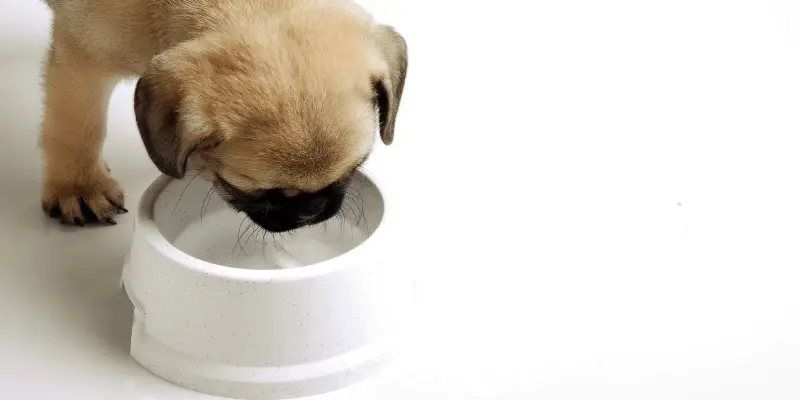
How to get a puppy to drink more
If your puppy isn’t drinking enough water every day, there are a few things you can do to encourage them to increase their fluid intake, which we’ll be going over below.
- Make sure the water bowl is clean and always filled with fresh water. Change the water at least twice daily.
- Reward your puppy with a treat or some praise whenever they drink. This will help them view drinking water as a positive!
- Offer your puppy ice cubes. Most dogs love chewing on these, especially on a hot day.
- Test a variety of water bowls to see which type your puppy prefers. For instance, some dogs dislike metal water bowls due to the sound they make when they scrape along the floor. If this is the case, you could use a ceramic or glass bowl.
- Flavour your puppy’s water with some bone broth or chicken broth to make it more appetizing. Add around a teaspoon of either to the water. It’s a good idea to have a separate bowl of unflavored water for your pup to drink, too.
- Contact a vet if your puppy is still refusing to drink as they may be suffering from an illness or disease.
Overhydration in puppies
Although it’s important to make sure your puppy is consuming enough water daily, if your puppy is drinking a lot of water every day, this can also be a cause for concern. Overhydration or water intoxication in puppies can be just as dangerous as dehydration.
Your puppy can overhydrate by drinking an excessive amount of water, especially in a short period of time, or by accidentally ingesting water when they are swimming or being bathed.
If you think your puppy is overhydrated or displays the symptoms below, you should take them to a vet as soon as possible.
- Nausea
- Vomiting
- Loss of coordination
- Lethargy
- Bloating
- Staggering
- Pale gums
- Dilated pupils
- Excessive salivation
Puppies that drink too much water may have polydipsia, which can be a sign of an underlying medical condition like diabetes, Cushing’s disease, kidney issues, or an infection of the uterus. If your puppy is also urinating excessively, it’s even more crucial to get them checked out by a vet.

